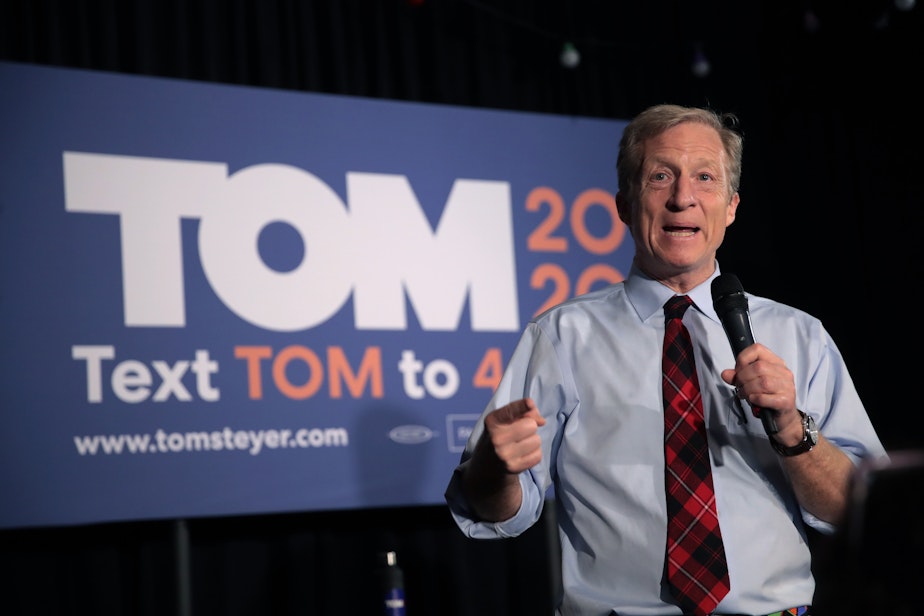Tom Steyer Thinks His Progressive Policies Will Win Big in South Carolina

Presidential candidate Tom Steyer describes himself as “a straight-up progressive,” ahead of the South Carolina primary, but he warns against nominating Bernie Sanders, whom he calls one of the field’s “extremes.”
Steyer has invested major campaign resources in South Carolina, where he’s showing more support than in other state and national polls. Former Vice President Joe Biden is expected to win the state’s primary on Saturday with the support of black voters, but Steyer has been making plays for those same votes.
“I’ve spent more time here than anybody else,” he says. “I have looked more people in the eye. I’ve eaten dinner with more people.”
After failing to make the debate stage in Nevada, Steyer was back in the South Carolina debate, where he met attacks from Biden over his previous investment in private prisons.
Still, Steyer says his policies on climate and race are evidence of a bona fide progressive agenda. He is the only remaining candidate who supports reparations for slavery and says he would declare a national emergency in response to climate change on the first day of his presidency.
Sponsored
He’s pushing these policies in the face of the perception that he’s a middle-of-the-road candidate — an idea he rails against.
“I think the reason that people think that I fall in the middle is I have a business background. I started a business on my own. I built it up and I walked away from it,” Steyer says. “ … But in terms of environmental justice or economic justice or racial justice, I’m a straight-up progressive who believes corporations are dominating our government.”
Steyer’s performance on Saturday is likely to decide the future of his campaign. But he resists the idea that, in light of his low national polling average, he should get out of the way for more popular candidates like Sanders.
Interview Highlights
On why he’s focused on campaigning in South Carolina
Sponsored
“South Carolina is a state which reflects the diversity of the Democratic Party. It has a heavy proportion of African-American voters. It’s got a lot of Latino voters. The Democratic Party is a big tent with a lot of racial and ethnic diversity. And South Carolina is a state that reflects that, and I think South Carolina gets to make a statement about what the big tent that is the Democratic Party and the very wonderfully diverse American people get to say. So I’ve always wanted to make sure that I came here and spoke to, you know, every part of the Democratic coalition.”
On whether he has national appeal
“Well, I think that what I’m trying to do … show that I can pull together the coalition that is the Democratic Party, that in fact we don’t have to go with one of the extremes. We don’t have to go with the Democratic Socialist who wants to take over big parts of the economy. We don’t have to go with the former Republican mayor of New York City, that we can go with a progressive Democrat who speaks to the issues that count with Democratic voters. And so I’m trying to show in South Carolina that I am that person, that I am someone who can speak across the coalition — racial, ethnic and philosophical — that make up the Democratic Party.”
On whether he is a “middle-of-the-road” candidate
“… I think if you look at climate, I have the most aggressive program in climate. I declare a state of emergency on day one. No one else is saying that. In terms of race, I’m the person who talks explicitly about race, who is for reparations for slavery, who believes that unless you deal with the subtext of race in virtually every policy area in the United States, then you’re not really dealing with that policy area honestly …
Sponsored
“And so when you talk about race, I’m the most aggressive person. I’m the most progressive person … And we have to stand up for working Americans. This is a broken government where people are getting the short end of the stick and have for 40 years.”
On whether he’d be willing to drop out of the race if he performs poorly in more primaries
“First of all, I’m trying to show that I am a top contender … I’m trying to show that, in fact, I can pull together this coalition in a way that other people can’t. That’s what I’m doing here in South Carolina is talking to people directly. I’ve spent more time here than anybody else … I’ve heard the stories about toxic water. I’ve heard the stories about really, really low wages. I’d never heard the expression before of a health desert where there’s no health care, you’d die on the way to the hospital. But I certainly have heard it here in South Carolina. And so I’m trying to show that, in fact, I am the person who can pull it together.
“But the other thing which people may or may not know is this: I started one of the biggest grassroots organizations in the United States, NextGen America. NextGen did the largest youth voter mobilization in history in 2018. So when people talk about pulling the Democratic Party together, about turnout, about actually winning elections by appealing to the tens of millions of Americans who don’t vote because they think the system is broken and both systems lied. Actually, I’ve been spending a decade working on that. And from the grassroots, registering millions of voters, engaging millions of voters, and more than doubling the turnout of young people in the districts where we work.”
Cristina Kim produced and edited this interview for broadcast with Todd Mundt. Lynsey Jeffery and James Perkins Mastromarino adapted it for the web.
Sponsored
This article was originally published on WBUR.org. [Copyright 2020 NPR]
